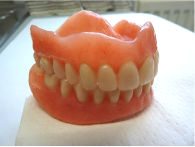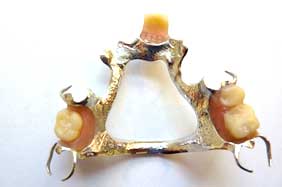Dentures
Dentures replace missing teeth and are removable
What are dentures?
Dentures are replacements for missing teeth that are removable from your mouth for cleaning. Impressions are taken in your mouth and dentures are custom made in a dental laboratory.
Full dentures
Replace all your teeth if they have been removed. They are usually made of flesh coloured plastic, with tooth coloured plastic teeth.
The base of the upper denture usually covers your palate and the lower denture is horseshoe shaped to cover the lower ridge and allow space for your tongue.
Full dentures can also be held in place with implants.


Partial dentures
Partial dentures are plates with one or more teeth on them. They are usually made of plastic or plastic and metal and held in with metal clasps.
Plastic dentures are less expensive than metal dentures, but can damage teeth that theymsit against. Metal dentures are made from a cobalt chrome alloy with plastic teeth and gums.
They are more expensive, but lighter and stronger than plastic dentures and rest on the teeth rather than the gums, which is better for the health of the gums. In most cases, metal dentures give the best results.

Immediate dentures
Immediate dentures are usually placed when a tooth has just been extracted. This means that you are never without teeth.
However, the bone supporting the teeth will reshape as it heals causing the denture to become loose over time. The denture may then have to be relined or remade. Sometimes these dentures are fitted temporarily to allow the bone to reshape before a permanent bridge or implant can be fitted.
How long do dentures last?
After teeth are extracted, the bone that held the teeth in the jaw starts to reshape and disappear. This happens more rapidly at first but continues for many years causing the denture to become loose. Dentures may then need relining or remaking to improve their fit. Depending on their design, metal dentures tend to last longer as they are stronger and because they are largely supported on the teeth, their fit is less likely to be affected by bone shrinkage.
How can I look after my dentures?
Denture cleanliness is essential to prevent bad breath, poor appearance and the harmful effects of plaque and calculus build up on your teeth and gums, so it is important to clean your teeth and your dentures, if possible, after every meal. We will give you advice on how to clean your dentures when we fit them. Many patients like to keep their dentures in at night, but if you do take your dentures out, never let them dry out.
Why are upper dentures easier to wear than lower dentures?
The shape of your ridges and palate can influence how well your dentures fit and how much suction you have to hold them in. Most complaints are about lower dentures. This is because there is no large area for denture suction, unlike the palate, and the ridges are much smaller than the upper ridges. The lips, cheeks and tongue are also trying to dislodge the denture. The lower ridge also shrinks up to four times more than the upper ridge causing the denture to become looser much quicker.
What are the alternatives to dentures?
The main alternatives to dentures are bridges and implants. Please speak to us if you would like to know more and we will be able to advise you as to what treatment options are available to you and which type of treatment would suit you best.
Need to know more?
Our opening hours
We are open Monday - Friday and closed for lunch between 1 – 2pm
On Fridays, surgery is only available in the morning.
Got an emergency?
If you require emergency dental treatment, please click below for details and advice.
